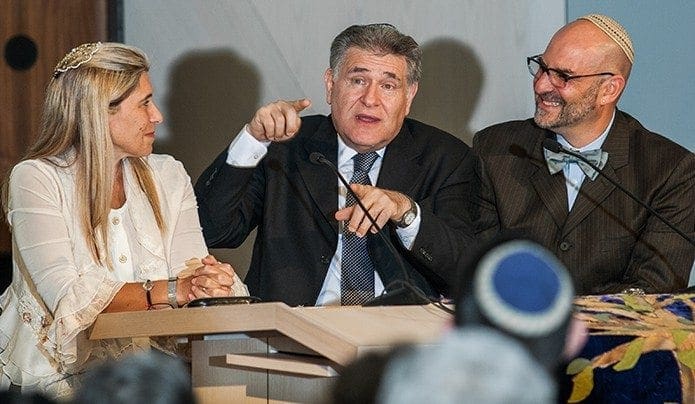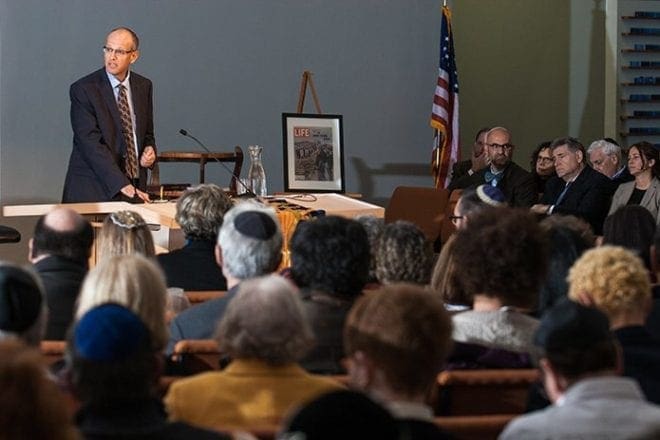 Photo By Thomas Spink
Photo By Thomas Spink
Atlanta
Rabbi Skorka: Pope Francis keeps people close, even those disagreeing
By ANDREW NELSON, Staff Writer | Published February 5, 2015
ATLANTA—Affectionately dubbed the pope’s rabbi, an Argentinian Jewish leader shared stories and insights in Atlanta recently into their unlikely friendship that started with needling about soccer teams and led to an embrace at Jerusalem’s Western Wall, the holiest place Jews can pray.
“God blessed us to materialize a common dream,” said Rabbi Abraham Skorka about the historic moment of prayer during the 2014 spring trip to the Holy Land with Pope Francis.
The rabbi was part of the pope’s official entourage during the pilgrimage. At the Western Wall the pope simultaneously embraced the rabbi and Omar Abboud, a Muslim leader from Buenos Aires.
Rabbi Skorka described the pope as “a real Jesuit, not because he is a part of the order of the Jesuits, but because his real master in which he inspires is Jesus.”

Rabbi Tzvi Graetz, executive director of Masorti Olami, the World Council of Conservative/ Masorti Synagogues, addresses some 300 attendees at the evening panel discussion where Rabbi Abraham Skorka spoke on his friendship with Pope Francis, among other topics. Photo By Thomas Spink
More than 300 people attended an evening panel discussion Jan. 18 at Congregation Or Hadash in Sandy Springs where he spoke.
It was the kickoff event for a year of activity between the Archdiocese of Atlanta and the American Jewish Committee (AJC) Atlanta Regional Office to celebrate the 50th anniversary of the Second Vatican Council document “Nostra Aetate,” which transformed the church’s approach to Judaism after centuries of troubled relations.
Neighboring Catholic and Jewish congregations are encouraged to plan events to celebrate and explore “Nostra Aetate.” The year is to conclude with a celebration of art, music and religion on Oct. 28 at the Ferst Center at Georgia Tech.
The affection between the two Argentinian spiritual leaders is a hopeful sign and a motivator to encourage interfaith dialogue, said Dov Wilker, the regional director of AJC Atlanta.
“By being able to show the personal relationship between Pope Francis and his friend, Rabbi Skorka, it shows how far we have come in Catholic-Jewish relations, but that we can and should be continuing the relationship for another 50-plus years,” he said in an email.
Rabbi Skorka co-authored with Pope Francis, when he was Cardinal Jorge Bergoglio, archbishop of Buenos Aires, a book of dialogues on human questions and responses from Judaism and Catholicism. The book is titled “On Heaven and Earth.” They also co-hosted more than 30 television shows about current topics.
The two became friends in the mid-1990s at city religious events after joking which of their soccer teams was better.
Rabbi Skorka told how he was invited by the Vatican to participate in an interfaith dialogue, to represent the Jewish perspective, in complete freedom and in the manner that he saw best.
Wilker said that story “shows incredible strength in Pope Francis and his relationship with Rabbi Skorka.”
Pope Francis’ practice is to engage with people, listen to them, “not to leave them alone,” said Rabbi Skorka.
On matters where the pope disagrees with people, it is not at arm’s length, said the rabbi. There remains a bond. He described it as “(I) don’t agree with you … but I am very close to you and to your drama. You are not indifferent to me. I don’t reject you.”
Together, the two men want to share a message “for the building of a better world in the future,” he said.
Rabbi Skorka visited Atlanta on the weekend of the Dr. Martin Luther King Jr. celebration to speak on the “prophetic voice” and how religious tradition and values can transform society. He was joined in the panel discussion by Rabbis Analia Bortz and Mario Karpuj, the spiritual leaders at Congregation Or Hadash. It was his first stop on a tour of the United States focused on religion and politics. The lecture and speeches were organized by Masorti Olami, the World Council of Conservative/Masorti Synagogues.
The proclamation of human rights is not new, but has biblical roots, Rabbi Skorka said. The prophets trumpeted centuries ago the call for “respect of your neighbor,” he said.
“The idea of human rights was not discovered. It is not an invention of illuminism and the French Revolution. When you make the simple exercise to open the Book of Amos, almost the whole book is a call for human rights,” he said.
“The first commandment of the real prophetic voice is respect the other,” said Rabbi Skorka. “All the time, it is not injuring the other. Respect.”